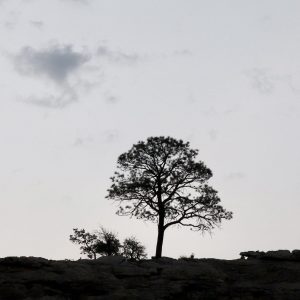The yucca were charming. They played peekaboo from behind the oaks; they huddled like puppies at big dogs’ feet. They stretched wooly-bear caterpillar legs across the boulders, or radiated cool perfection in the shade.

Of course, they were also ferocious in defense. With spikes, spear-points, knife-edges, they could cut soft flesh to shreds. Succulents have a resource the rest of the desert wants, and they will protect the water in their leaves with every fiber of their being.
I was smitten by the yucca at Cochise Stronghold in the Dragoon Mountains of southeastern Arizona, by their whimsy and perfection and ferocity, by the gentle blues in shade; at the way they could delight and repel with equal strength.

The Stronghold itself moved me with its opposites. I can see why the Chiricahua Apache chief Cochise chose this area as his base of military operations. It has everything a good general could want: water, food, shelter, watch places, crags where skilled defenders could hide to wage war unseen. You sense the strength of the place, in the massive walls of stone, in the sturdy oaks that ring them.

I can also see why Cochise chose the Stronghold as his home when the years of warfare between the Apache and American nations had passed. It has everything a heartsick warrior could want: shade or sun at will, a garden of tranquil greenery, gentle serenity. It is a warm place, hospitable and gracious. When the wind blows through the leaves of those strong, sturdy oaks, they don’t clatter or rustle or roar. They barely whisper: “Hush. Hush.”
As I read more about Cochise’s history , those opposites—the defense and hospitality—moved me to sorrow. Cochise chose this place from necessity for warfare, but he also chose it, with its warmth, whimsy, and graciousness, for love. A person’s loves says a lot about their values. Who would Cochise have been, without a false accusation, a parley turned ambush, and the torture and murder of his family?
For a yucca the cost of bearing weapons is nil. Its soul does not suffer from that violence. For humans there is a price. Yet there is also a price for gentleness. We have to choose between defense and hospitality every day, in small ways and large, and we and everyone in our wake will pay for it, sometimes for generations.

What is the cost of gentleness, of strength shaped to blessing? What is the cost of conquest or defense, of strength shaped to warfare? It’s perhaps the most fundamental question before us: which we prize more, our lives and our loved ones’, or our wholeness.
On a personal scale I ponder that as a woman traveling solo. Statistically I am exponentially safer in the wilderness than in a city, and alone than living with a man I love. But leaving the familiar wakes you to the danger of the unknown. (A reminder: The familiar is a great lullaby. The future is equally unpredictable for us all.) At Cochise Stronghold I met yet another well-meaning camper who encouraged me to go through life armed to the teeth to protect myself. I have also met people who assure me I won’t encounter danger if I don’t expect it—a kind of magical thinking I find suspect. It seems to me the point is to face the possibility of risk and ask, “Who am I willing to be in self-defense, and at what cost?”
The name Cochise means “Having the strength of an oak.” In its natural habitat, an oak’s strength nurtures a forest’s worth of lives beneath its boughs. It holds firm and whispers peace in harsh winds. What are the consequences for a human, of being a nurturing oak amid those who do not wish us well?

When can we afford to be gentle, to shape strength to blessing?
When can we not?



